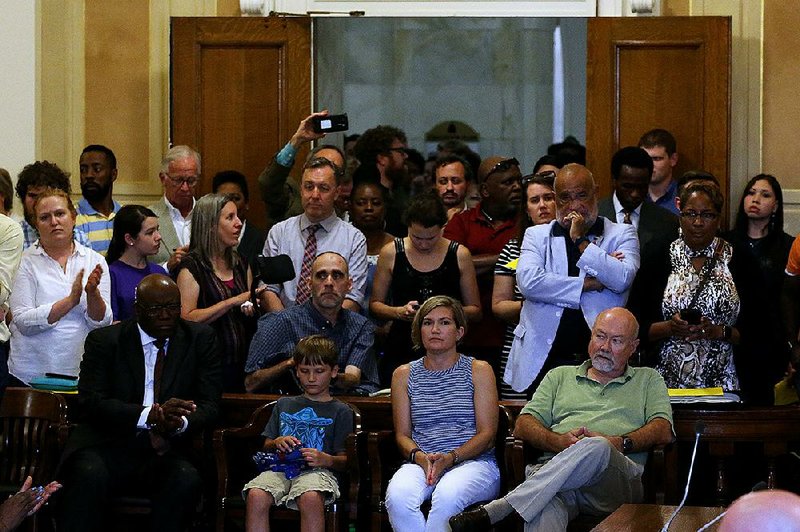The Little Rock School District has great promise and the potential to be a shining star in the nation, Arkansas Education Commissioner Johnny Key said Thursday at a town-hall meeting on the status and future of the state-controlled school system.
"We are making strides. There are examples all over the district of great learning, great teaching and great accomplishments," Key said at the state Capitol forum that was organized by Sen. Joyce Elliott, D-Little Rock, and several other Pulaski County area legislators.
About 200 people attended the session, including former Little Rock School Board members, Mayor Mark Stodola, district Superintendent Mike Poore, Little Rock Regional Chamber of Commerce President Jay Chesshir, school district employees, charter school leaders and other community leaders and civic activists.
"I think the Little Rock School District has the great potential to be the shining star of all the capital city school districts in our nation," said Key who acts in place of a locally elected school board in the state-managed system and has been criticized by some for not being accessible to district residents. "The foundation is there. I think the professionalism is there and I think the desire is there. I just appreciate the leadership of Mr. Poore and his team, and that goes down to every level of the district, every building, every department. I just see a great future."
About 30 people at the forum posed challenging questions or voiced strong opinions to Key, to Poore and to members of the Arkansas Board of Education who were present about the ongoing state control and workings of the 24,000-student district. Others wrote questions on cards that were later read aloud by Elliott.
David Coleman of Black Focus Radio told the crowd that he has discerned from his work that "there is a seething anger about what has happened to the Little Rock School Board."
Angela Hunter, another speaker and a parent of two children in the district, said she was appalled by the lack of possible timelines for the release of the district to local control.
State Education Board Chairman Jay Barth of Little Rock, in response to what many in the crowd wanted to know regarding the timing for the return of the Little Rock district to a locally elected school board, said state leaders are being guided by the terms of Act 930 that was passed by the Legislature earlier this year.
Education Department staff members are undertaking a study of the district's academic and financial systems and its facilities, Barth said. Agency staff members will report their findings to the Education Board later this year, at which time the board has the authority to decide how to proceed. Should the board decide to return the district to local control, he said any school board election, by law, would have to be held in either May or November of any particular year.
The new law differs from the state's previous school accountability law that required schools and school districts to be labeled as academically distressed if fewer than half of their students scored at proficient or better on state math and literacy exams over a three-year period.
The state Education Board voted 5-4 in January 2015 to take control of the Little Rock district because six of the district's 48 schools had been so labeled. The superintendent was placed under the direction of the education commissioner and the elected school board was dissolved. Since then, three of the six academically distressed schools have been cleared of the label. Additionally, the state law no longer requires that at least 49.5 percent or more of students score at proficient as a way to avoid the distress label.
Barth, who opposed the takeover of the district in 2015 and attempted to win its release from state control earlier this year, said Thursday that community engagement is crucial to a healthy district and that loss of support in Little Rock was evident in the May 9 defeat of a proposed tax extension for the construction of a new high school and improvements to schools districtwide.
He also noted that a state-appointed citizens committee recently cautioned against the continued approval of new publicly supported charter schools in the Little Rock area without determining at what point the growth of independently run charters jeopardizes the viability of traditional public schools.
"We've got to be careful," Barth said to applause from some in the audience.
Key told the audience that the department is working with an organization, IFF, to do that kind of analysis in Pulaski County.
Katherine Donald, a Little Rock resident, started off the questions by asking how Key, as a "school board of one" transitioned from dealing with six academic distressed schools to making decisions as if the district was in fiscal distress, including the approval of the sale of district assets. The district earlier this month sold one of its schools to a company owned by the Walton Family Foundation of Bentonville, which has plans to lease it to a charter school organization. The district has sold three other schools this year.
Key said that state law gives decision-making authority to the commissioner for the whole gamut of school district operations. He also noted that while six schools were labeled as academically distressed, there were other schools that had been identified as needing improvement because of low achievement or achievement gaps between groups of students.
In response to questions regarding whether the public must be notified of a public meeting when Key acts on a Little Rock district matter, Key said the law does not require that.
Anika Whitfield, who earlier this year led the Save Our Schools organization in opposition to closing three schools and reconfiguring a fourth school, questioned why Key would agree to meet with the public at the request of lawmakers but not at the request of her organization earlier. Key said he did meet with Whitfield and others about the proposed school closures.
Asked why the district was receptive to private funding of a new sixth-grade football program but opposed the Save Our School plans to raise money to keep the schools in operation, Key said Poore did not feel that was a viable option, that the school district needed to reduce ongoing expenses.
Rev. Maxine Allen, head of the Little Rock Christian Ministerial Alliance, questioned Key and Poore on their decision to issue second-lien bonds to help pay for the construction of a new southwest Little Rock high school and improvements to other campuses after Little Rock voters soundly defeated the proposed tax extension in May.
"That is not transparent," Allen said.
Key responded that the issue of $90 million in second-lien bonds is different from the $160 million plan put to voters. District leaders have a responsibility to meet the needs of students and those needs include the replacing of McClellan High, he said.
Poore said that the plan to build a new southwest Little Rock high school was a commitment made by the district leaders at the time it had an elected school board.
In addition to the return to local control and questions about charter schools, alterations in the gifted education program at Dunbar Middle School, course scheduling delays at the high schools, increased teacher paperwork, and the need for services for students with dyslexia were among the topics raised.
Teresa Knapp Gordon, president of the Little Rock Education Association union of employees, told the crowd that the Little Rock district has cut its expenses.
"We were taken over for academic distress," she said. "We now have three schools in academic distress out of 40. There is no other district in the state with that ratio that has been taken over. Our employees want to know when there is going to be an end to this. Our district wants to know when there is going to be an end to this. All of us, everybody in this room, everybody in the community is going to have to put aside our agendas and come together to make our district whole again -- with the support of the state board, with the support of Mr. Key and with the support of Mr. Poore. We have got to do that or we will never get our district back. "
Elliott said at the end of the session that it is very obvious that people in this district care about what is going on.
"This is a good thing to have happened today -- to have this meeting. Will it continue to happen for the people in the Little Rock School District. I'm assuming the answer to that question is going to be, 'yes.' I hope we will follow up in other kinds of venues, other than someplace like here."
Metro on 08/25/2017


